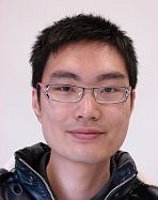How did you start doing research of Solvation Science in RESOLV?
When I was a PhD student, I joined an international conference in Mainz, Germany. There I met a student from the Havenith group who told me about an open postdoc position in the group. I simply wrote an email to Professor Havenith to apply for the position and I was accepted.
What was your Ph.D. topic and why did you decide to do a postdoc in Solvation Science in RESOLV?
My PhD topic was studying salt effects on protein hydration via Terahertz Time-Domain Spectroscopy. It is closely related to the research of Prof. Havenith. Therefore, I decided to join her group to gain both international experience and hands on experimental skills.
How important do you think your three years within RESOLV have been?
I learned a lot, such as experimental techniques and data analysis of laser spectroscopy which are important for entering relevant industries. In addition, what I liked the most was the atmosphere in RESOLV. I met many new people from different countries and I learned about different cultures, which is crucial for both academic and industrial career.
Would you recommend others to join RESOLV and why?
It depends on your research interest and your career plan. If you are interested in areas like protein hydration, electrochemistry and chemical reactions involving water, then highly recommend it.
What did your research as a postdoc in RESOLV lead to?
We had nice results for example in the generation of broadband THz pulses, which is important to gain information about solvation dynamics. In another publication...
What was the driver for doing a second postdoc in Japan and were there any other options?
The driver is to find a permanent position in Japan. Being on-site facilitates the whole process.
What is your current research topic?
We are currently developing a highly sensitive microscopy which requires good skills in optical alignment.
What are the differences and similarities between doing research in Germany and in Japan?
The time of work is different. Scientists in Germany arrive earlier but also leave earlier, while in Japan it is the opposite in the way, we come later and leave also later. People in Japan sometimes also work on Sundays. It is not a problem for researchers to work till late night or in weekends in Japan as one can always find open stores for food and refreshing. Another difference is the supervision. Group leaders in Germany decide on the topic for students and post docs, but at the same time students have different options and can bring their own ideas. In Japan Ph.D. students and postdocs have to choose their own topic but there are more regular meetings to help them with their work.
How is the funding of research program from the government in Japan in comparison to the case in Germany?
Not much difference. Importantly, young researchers in Japan can also apply for funding like in Germany.
Which career are you now planning? A research career in academics or a career in industry and why?
Originally, I planned to stay in Academia, where one also has to supervise students while doing research at the same time. During my stay in Germany, I realized that teaching is not a suitable task for me. Therefore I am now thinking of going to the industry.
How can one (Master/Ph.D. graduates) be prepared for finding positions after their studies?
There is no short cut. One always has to concentrate on doing his/her own research in the best possible way. And be aware that gaining both theory and practical experience are equally important for determining the qualification.
Can you give some advice to young scientists that face several challenges when they start in the research career?
Don't be scared by bad results and always try to think outside the box! One should try new ideas whenever it is possible as you may have unpredictable results or outcomes while doing research.
————————————————————————————————————————————
About the author




